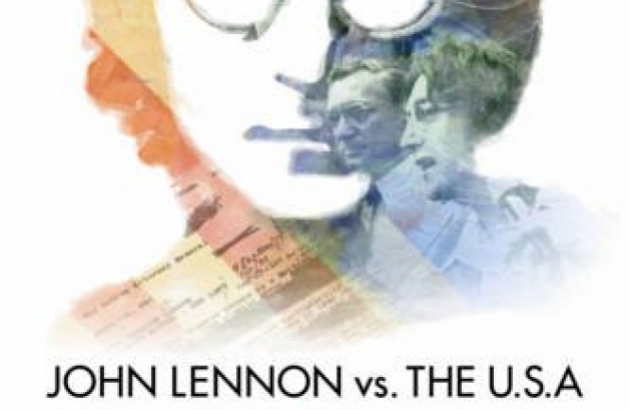* * * *

* * * *
On March 23, 1973, U.S. Immigration ordered John Lennon to leave the U.S. within 60 days. The reason? His conviction in 1968 in England for possessing marijuana. But, “As we now know … it had more to do with President Richard Nixon administration’s general fear of Lennon, his political views and his influence.” Lennon fought the deportation and ultimately won. That included the right to stay, specifically, in New York City at the Dakota Apartments, 1 West 72nd Street. There, on the evening of December 8, 1980, he was gunned down by Mark David Chapman. The thing is, if he’d lost his deportation battle he might still be alive today. (As “Sir John.”)
That’s what you might call an unintended consequence, and that brings up why I’m not reviewing the movie Conclave as I planned for this post. It’s because the recently-decided election includes an unintended consequence from 2020. Specifically on why it might have been better if Trump had won the election back then. The main reason? Because he would have had to deal – probably ineffectively – with the war in the Ukraine, the war in and around Israel, and especially the runaway inflation that proved to be such a big factor in the election.
Thus my conclusion that it probably would have been better if he’d won back in 2020:
My main concern? He’d still be eligible to run in 2024, and in the intervening four years – with a Democrat as president – he might just wreak more havoc to American democracy than he could as president… So wouldn’t it be better to get it over with? To get rid of Trump once and for all, in 2024? Then too, if he did get re-elected in 2020, he would immediately become a “lame duck.”
To clarify, it might have been better to get rid of Trump on January 20, 2025. That’s when he’d be leaving the White House for the final time, instead of coming back again. (Like some “Undead Revenant?”) On the other hand, my comment about him “wreaking more havoc” – lingering on at the sidelines since 2020 – certainly turned out to be prescient. (But not in the good way.)
And incidentally, the film Conclave had a not-too-subtle message on why the Sovereign People should not have voted as they did last Tuesday, but that’s a topic for a later post. (Hopefully.) But “the People” have decided and Trump will be back in office next January 20. Which means it’s time to review some other prognostications I made about such a second term.
First off, about that lame duck business. In one definition it means the time between Election Day and when the new president takes office, on January 20. (In this case, 76 days or roughly two and a half months.) Meaning Joe Biden using those 76 days for unfinished business and take some final steps to shaping his legacy. But in another definition it refers to the fact that “any U.S. president winning a second term ‘automatically becomes a lame duck.’”
That’s because the Twenty-second Amendment keeps a president from serving a third term. Thus he “doesn’t have to worry about getting re-elected.” In Trump’s case, that means he no longer has to “worry about throwing raw meat at his wacko base.” Then too he might start appreciating that he is “much closer to the end than to the beginning,” and that he’ll soon meet His Maker. Then too, being much closer to the end than the beginning, he might seriously start thinking about his legacy. (At 78 he is the oldest president ever elected.) Then too, while in office he might have a mini-stroke like the Apostle Paul’s, and have a Conversion Damascus Road experience. (Or a Mini Heart Attack? President Eisenhower was 65 when he had his first.)
For one example from history about a second-term president doing an about-face: “Ronald Reagan signed an arms control treaty with Soviet leader Mikhail Gorbachev,” despite his opposition to arms control during his first term. Might Trump also change some of his attitudes and rhetoric at some time during his second term?
Unfortunately, that second lame-duck definition can be a two-edged sword. It can liberate a president like Reagan to work for the common good, or it can make that second-term president dangerous. Either way we’re in for some interesting times coming up. (Like that ancient Chinese curse that says, may your children live in interesting times?)
Either way, “that which does not kill us will make us stronger,” and Trump won’t kill American democracy, try as he might. We love to complain about whoever is in power, we hate being told what to do, and we have a habit of building a leader up, then tearing down. Besides that we’re too damn ornery. Meanwhile, thinking ahead to next January 20, 2025, it will be 1,461 days until Trump leaves the White House, “at the latest,” for the final time. Let the countdown begin…
* * * *

* * * *
The upper image is courtesy of John Lennon Deportation Case Image – Image Results. See also When John Lennon Was Ordered to Leave U.S. by Authorities, You May Say He’s a DREAMer: John Lennon’s Immigration Case, and The U.S. vs. John Lennon – Wikipedia (on the 2026 documentary about the case). On his death, see Murder of John Lennon – Wikipedia.
Re: Unintended consequences, see Wikipedia: “In the social sciences, unintended consequences (sometimes unanticipated consequences or unforeseen consequences, more colloquially called knock-on effects) are outcomes of a purposeful action that are not intended or foreseen.
I borrowed from two prior Trump posts, from August 2019, On “why it might be better…” (Gasp!), and On a second Trump term, from August 2023. In a future post I may review in greater length that 2021 Donald Trump – the newest “Undead Revenant?”
Re: “Lame duck.” Some sources define the term as – in this case – the time available to Joe Biden between now and January 20, 2025 when Trump takes office. See e.g. What lame duck president Joe Biden can still do, and Biden uses lame-duck presidency to shape legacy. As to the second definition see Lame Duck: Definition, President, Amendment, Session – ThoughtCo.
Re: DDE’s heart attack. See Eisenhower’s 1955 heart attack. See also President Dwight Eisenhower: Health and Medical History, saying he had four such heart attacks.
Re: Chinese curse. I heard it first as “may your children ilve in interesting times.” But Wikipedia has it as, “may you live in interesting times.” Also that no actual Chinese source has ever been produced, and that the “expression is ironic: ‘interesting’ times are usually times of trouble.”
The lower image is courtesy of Nietzsche Quotes That Which Does Not Kill Us – Image Results. The link in the caption is to Tough sledding – Idioms by The Free Dictionary, meaning a “difficult, turbulent, or troublesome period of time.” (Call it artistic license.)
* * * *